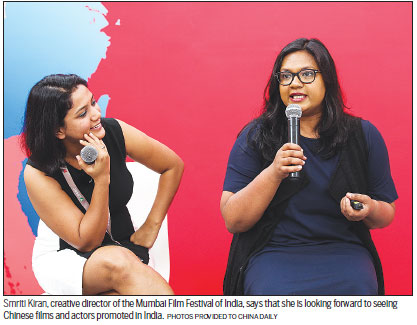Cultural exchange through films

Belt and Road program by SIFF to boost mutual understanding among nations
Countries involved in the Belt and Road Initiative came under the spotlight at the 20th Shanghai International Film Festival (SIFF) that took place from June 17 to 26.
On the opening day, festival officials marked the launch of the new Belt and Road program at SIFF this year by signing a memorandum of understanding with 14 countries related to the Silk Road Economic Belt and the 21st Century Maritime Silk Road to promote film culture exchange.
Zhang Hongsen, deputy head of the State Administration of Press, Publication, Radio, Film and Television of China, said at the signing ceremony that "the cultural exchange through film can largely accelerate mutual understanding and cooperation between people in the countries related to the Belt and Road Initiative".
He also hopes that filmmakers can take advantage of the opportunity to work on co-productions, film projections and festivals.
According to Wu Xiaoming, artistic director of the Shanghai Municipal Administration of Culture, Radio, Film and TV, 1,016 films of the 2,500 that were received by the SIFF this year came from the 47 countries related to the Belt and Road Initiative.
To further promote exchange with these countries, SIFF introduced a series of new programs to its itinerary this year, such as the announcement of co-productions, roundtable panels and special recommendations at the film market that took place from June 18 to 20 at the Shanghai Exhibition Center.
Smriti Kiran, creative director of the Mumbai Film Festival of India, said she made 15 new friends at the SIFF because of this new Belt and Road program. She added that she is looking forward to seeing Chinese films and actors promoted in India.

The Indian film Dangal landed in China's cinemas in May and earned an impressive 1.2 billion yuan ($176 million) at the box office, becoming the best-selling non-Hollywood film in China.
Released in 2016, the film is about the life of Mahavir Singh Phogat, an amateur wrestler who trained his daughters to become world-class athletes who eventually won medals at the 2010 Commonwealth Games.
Ren Zhonglun, president of Shanghai Film Group, said that the success of Dangal came as a surprise, given how Chinese cinemas hardly screen movies from India and local audiences aren't big fans of such shows.
He added that no Chinese film has ever achieved this level of success in the past few years and that Dangal has taught local filmmakers a lesson - that a good storyline, which he said is lacking in some Chinese films, is something that will always resonate with viewers.
Kiran believes the way Dangal was promoted on Chinese social media also played a huge part in its success.
She said that having Chinese agents and distributors involved provided a good perspective of what the local market was like and she suggested that a similar approach be taken when China releases its films in a foreign market.
"It is important to have representatives and someone whom people want to hear from go to another country to promote the film," said Kiran, who believes that a Chinese film can achieve in India what Dangal managed to do in China when both parties have a solid understanding of one another's cultures.
Kiran and other film industry representatives from the countries related to the Belt and Road Initiative also gathered for a public panel on June 20 to discuss potential co-productions, virtual film festivals and the creation of a mechanism that can support cultural exchange in the movie sector.
During the panel, Dimas Jayasrana, the official in charge of international affairs with the Indonesian film bureau, shared his experience of organizing the Festival Film Purbalingga which brings films to remote villages in the country. The small festival is funded by the organizers themselves.
Jayasrana and other festival officials have since 2007 been traveling to dozens of villages to showcase independent Indonesian films for three weeks every year. The team also encourages local high school students to make their own movies by organizing workshops and loaning film equipment.
Jayasrana said that these efforts have paid off after nearly 10 years of perseverance - students from the countryside are growing in confidence and some have even created films about serious societal issues such as underage labor.
With the help of volunteer translators, Jayasrana wishes to introduce foreign films to the festival and hopes to be able to roll out a similar event in remote villages in China.
zhangkun@chinadaily.com.cn









